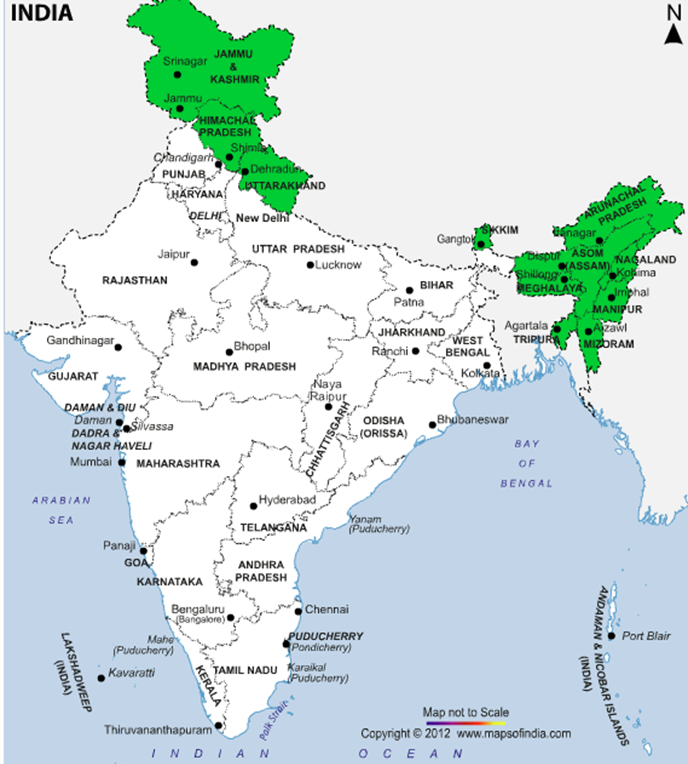BIHAR’S CALL FOR SPECIAL CATEGORY STATUS
Relevance: GS 2 – Parliament and State legislatures—structure, functioning, conduct of business, powers & privileges and issues arising out of these.
Why in the News?
- Bihar’s demand for special category status (SCS) has been a long-standing issue due to its economic and developmental challenges.
- The Bihar government estimated that granting special category status would help the state receive an additional ₹2.5 lakh crore over five years for the welfare of 94 lakh poor families.
- Bihar Cabinet passed a resolution late last year demanding SCS for the centre.
- Politically, granting special status to Bihar has significant implications, potentially affecting federal balance and resource allocation.
What is the Special Category Status?
- Introduced in 1969 based on the recommendations of the Fifth Finance Commission.
Fig: States with Special Category status
- Previously received grants based on Gadgil-Mukherjee formula (30% central assistance).
- Post-Planning Commission abolition, increased devolution for all States (41% in 15th FC).
- Aimed to help states disadvantaged in geographic, social, or economic status improve their standing compared to more developed Indian states.
Benefits of Special Category Status
- Increased funding from the Centre: States with this status receive 90% of funds from the Centre for schemes sponsored by the Union government, compared to 60%-80% for other states.
- Various tax-related concessions.
- Historical Examples:
- Initially granted to Jammu & Kashmir, Assam, and Nagaland in 1969.
- Subsequently extended to eight other states, including Arunachal Pradesh, Manipur, Meghalaya, Mizoram, Sikkim, Tripura, Himachal Pradesh, and Uttarakhand.
- Currently, 11 out of 28 states, or more than a third of Indian states, have special category status.
Reasons for Bihar’s Demand for Special Category Status
- Economic Backwardness: Bihar’s per capita income of around ₹60,000 is among the lowest in the country. The state also lags behind the national average in several human development indicators.
- Adverse Fiscal Impact: The bifurcation of the state, leading to industries moving to Jharkhand, has negatively impacted Bihar’s fiscal situation.
- Water Resources and Natural Disasters: Insufficient water resources for irrigation and frequent natural disasters have hindered economic progress.
- Poverty Levels: The 2022 Bihar caste-based survey indicates that nearly a third of the state’s population lives below the poverty line.
Challenges in Gaining Special Category Status
- Central Government Resistance: Union governments led by both the BJP and Congress have been reluctant to grant special status due to the increased financial burden on the Centre.
- Increased Tax Devolution: Following the Fourteenth Finance Commission’s recommendation, there has been greater devolution of taxes to the states from 32% to 42% of the total divisible pool, reducing the justification for special status.
- Political Implications
- Granting special status to Bihar would increase the amount of tax revenues the state receives from the Centre.
- The demand can be viewed as a strategic move by state governments to secure more funds from the Centre despite increased tax devolution.
Demand of SCS by other States
Other states like Andhra Pradesh and Odisha have also demanded special category status.
- Andhra Pradesh’s demand led TDP leader N. Chandrababu Naidu to pull his party out of the NDA government before the 2019 general election.
- Odisha faces frequent floods and has a significant tribal population.
Counter Arguments: Opposition to Special Category Status
- Increased funds to poorer states might incentivize poor policies.
- Could penalize more developed states that have better policies.
- Historically, slow growth and high poverty in Bihar and Uttar Pradesh were due to poor rule of law, not just lack of funds.
- Current Economic Growth: Bihar is one of the fastest-growing states in India:
- 2022-23 GDP growth at 10.6% national average of 7.2%.
- Per capita income grew by 9.4% in real terms in the previous year.
- Analysts argue that Bihar’s long-term prospects depend more on strengthening the rule of law than on receiving additional funds from the Centre.
- While special category status could provide short-term relief and funds for welfare projects, Bihar’s long-term economic improvement is likely to hinge on enhancing governance and the rule of law rather than on increased central funds alone.
Way forward to the SCS of Bihar
- Criteria Clarity: Establish clear, objective criteria for awarding Special Category Status (SCS) based on development indicators like poverty, infrastructure, and social welfare.
- Alternative Models: Explore options beyond SCS, such as the Raghuram Rajan Committee’s suggestion of a “least developed states” category based on a multi-dimensional development index.
- Data-Driven Decisions: Utilize verifiable data to assess Bihar’s development needs and track progress towards established goals.
- Investment Focus: Promote policies that attract private investment alongside central aid to foster long-term economic growth and self-reliance.
- National Consensus: Build a national consensus on development strategies to ensure equitable distribution of resources and address concerns from other states.
Alternative articles
- https://universalinstitutions.com/special-provisions-for-some-states/
- https://universalinstitutions.com/special-category-status/
- https://universalinstitutions.com/bihars-demand-for-special-category-status/
Source: https://www.thehindu.com/news/national/bihars-call-for-special-category-status/article68277523.ece
Mains question
Discuss the implications of granting special category status to economically backward states like Bihar. Evaluate the potential benefits and challenges, considering both short-term relief and long-term economic growth. (250 words)




